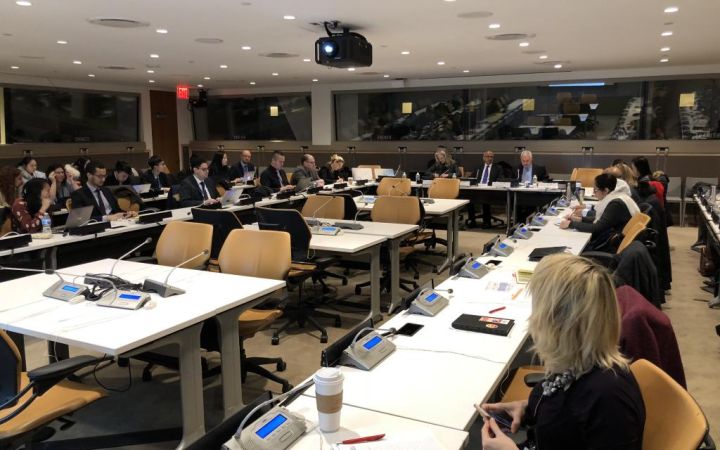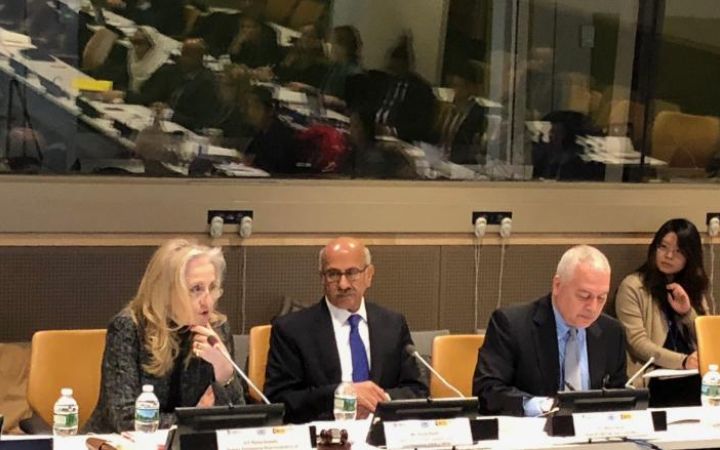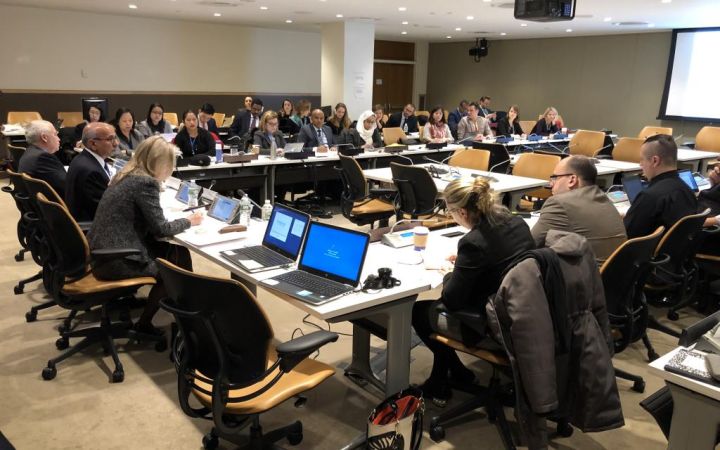26 January 2018, New York City, U.S.A – The United Nations Economic and Social Council (ECOSOC) and the United Nations Institute of Training and Research (UNITAR) jointly hosted a one-day orientation course for the members of Council. The event was hosted in the United Nations Headquarters in New York City. The orientation course consisted of five different sessions which have covered a wide variety of topics related to ECOSOC and its significant roles in advancing the three dimensions of sustainable development – economic, social and environmental.
The welcoming remarks were delivered respectively by H.E. Mariá Bassols, the Deputy Permanent Representative of Spain, Mr. Navid Hanif, the Director of the Office for ECOSOC Support and Coordination (OESC) from the Department of Economic and Social Affairs (DESA), and Marco A. Suazo, the head-of-office of UNITAR New York. The remarks have reexamined the history of ECOSOC and emphasized ECOSOC as “the central platform for fostering debate and innovative thinking, forging consensus on ways forward, and coordinating efforts to achieve internationally agreed goals.”
Following the welcoming remarks, Mr. Neil Pierre, Chief of the Office for ECOSOC Support and Coordination (OESC) form the Department of Economic and Social Affairs (DESA) has started the Session I with a comprehensive overview on ECOSOC. The overview has covered the ECOSOC’s substantive focus, its structure, functions, and expected outcomes during the year of 2018. Mr. Neil Pierre has addressed the reforms conducted by ECOSOC over the last decade and particularly emphasized the adaptation of General Assembly resolution 68/1, which is regarded by ECOSOC, as “the most far-reaching reform of the Economic and Social Council since 1991.” He also explained the indispensable role of ECOSOC in advancing inclusive and integrated policy dialogue, following-up and review, strengthening coordination and stakeholder engagement to support national efforts to achieve the 2030 Agenda among member states.
Ms. Emer Herity, the Secretary of ECOSOC from the United Nations Department of General Assembly and Conference Management (DGACM) focused on the ECOSOC’s internal structure and its functions. She introduced and explained the ECOSOC’s mandates and methodologies, especially in the context of the 2018 ECOSOC cycle. Aside from above, she has also mentioned the roles and functions of the President and Bureau on raising awareness and promoting engagement.
Session III featured three panelists from UN DESA: Mr. Huanyu Liu, the Economic Affairs Officer of Financing for Development Office, Mr. Neil Pierre from the Session I and Ms. Irena Zubcevic, Chief of Division for Sustainable Development Office. This session was on the roles and functions of ECOSOC and its forums, in particular the High-level Political Forum (HLPF), Financing for Development Forum (FFDF) and Development Cooperation Forum (DCF), in advancing the integrated implementation of the 2030 Agenda and related agendas, particularly in relation to effective follow-up and review. The panelists have introduced the mandates and modalities of each forum and most importantly, they explained in detail on the follow-up and review procedures of each forum. This session has shown the Council’s importance on creating an inclusive space to exchange experience, knowledge, and ideas for better results and has also provided a better understanding on how can the specific global functions of ECOSOC bring value to, and effectively support, national-level implementation of the 2030 Agenda.
In the afternoon, Ms. Zina Mounla, chief of Development Cooperation Policy Branch of OESC, UN DESA and Ms. Kanni Wignaraja, Director of UN Development Operations Coordination Office (DOCO) have introduced the Quadrennial Comprehensive Policy Review (QCPR) and how did ECOSOC follow the adoption of the WCPR resolution by the General Assembly in the Session IV. The talk has demonstrated how QCPR served as a guidance for United Nations Sustainable Development System and how did it effectively help achieving joint results at the country level.
Session V was led by Mr. Paolo Fontana, Political Affairs Officer from Peacebuilding Support Office and Ms. Sibel Selcuk, Programme Officer of OESC, UN DESA. The session was focused on the three crucial aspects of ECOSOC: Peace, Security, and Development. The panelists have illustrated ECOSOC’s relations with the Security Council and Peacebuilding Commission in order to provide a clearer perspective on how ECOSOC has served as a platform for its Member States to address global emergencies, trends and challenges, humanitarian responses and the needs of conflict-affected countries, in support of tailored international engagement.
The last session (Session VI) was presented by Mr. Marc-Andre Dorel, Officer-in-Charge from NGO Branch Office for ECOSOC and Ms. Sibel Selcuk from the previous session. Session VI covered the topics on multistakeholder engagement and how did ECOSOC foster, review, and strengthen the multi-stakeholder partnership. The panelists have introduced the previous ECOSOC Partnership Forum and provided examples of ECOSOC’s cooperation between civil society, the private sector, parliamentarians, local authorities, and academics.
The orientation course has provided an in-depth introduction to ECOSOC’s entity and its function in advancing 2030 Agenda. Delegates have familiarized themselves with the role and functions of the ECOSOC and its methods of work, identified and assessed the main issues before the Council was established, and gained a better understanding of the roles of ECOSOC in general. Based on case studies presented by international experts relating the adoption of resolutions, delegates also gained perspectives on the negotiation dynamics between ECOSOC and other institutions.




